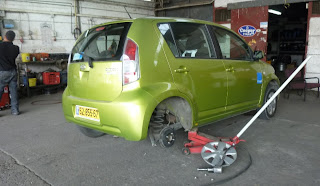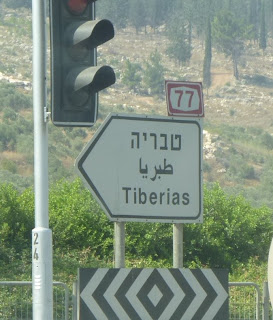(See more on that at the end of the e-mail.)
On Saturday night as we left Kiryat Shmona, our cousin Boris saw that the tire was again low, so we stopped at a nearby gas station and filled the tire again. The next morning at Menahemia, the tire still looked OK, but Howard wanted to fix it before we headed up the Golan. Our friend Dalia directed to us a local “puncheria,” or tire repair shop.
Local "Puncheria" shop "Puncherit HaEmek"
The screw that caused the problem
For 35 shekels (US$9+), they took off the tire, removed a screw from it, patched it, and put the tire back on. Drivers of rental cars in Israel are responsible for tires, and this is the second time we’ve had a tire problem. The other I took care of in Kiryat Malachi a few years ago.
Highways in Israel really have improved since I first visited and lived here in the early 1970s. Then roads were narrow, made more for smaller European cars. Now that Israelis buy bigger cars and there are more big trucks on the roads, the lanes are wider and shoulders are decent size too. Since the mid-90s, there has been an explosion of car buying also. Many employees of big companies also get company cars as do my cousins in Holon. She is a computer engineer and he a water engineer.
Road signs are quite good. All highways are numbered, with the bigger roads having single or double-digit numbers. Highway 6 (blue sign) is mostly a toll road, and the Israelis love it as it much faster than the other roads. There are no toll booths. There are cameras on the highway that take pictures of license plates, and people are regularly sent bills for usage. (The toll road part was built by a private company which will maintain it and keep it for 20 years.)
Most Israels do not know the highways by number (except for highway 6--kvish shesh--which is actually the Rabin Memorial Road) but just by direction and junction name. Since the junction names are slowly changing to exit areas, it can sometimes be confusing. Google maps now has many of the Israeli roads and towns labeled in English now. My husband was delighted to have found a street map of Kiryat Malachi on his IPad.
a stretch of Hwy 20, the "Ayalon," the main road into Tel Aviv
Often the walls along the side of the road are covered with greenery or very nicely designed, like on the left. BTW, notice the clouds in the sky. This summer, often before 10 a.m., there have been a LOT of clouds in the sky, much more than in the past....and sometimes dark grey.
A tunnel in the new stretch of Highway 6 in the North--a rather amazing site to see in Israel
A 2-lane road in the hills east of Tiberias taken through our car windshield. See how wide the shoulders are.
A four-lane road, divided by a barrier--a safety precaution
New construction--widing of the road to a divided highway, in the lower Galilee
A site on the road near Kvar Tavor--a couple carrying cactus fruit in the trunk of the car with the trunk open so that the fruit won't spoil. The driver is either taken them to market or to sell along the side of the road. Many local Arabs sell produce along the side of the road. We have bought from them occasionally.
















No comments:
Post a Comment